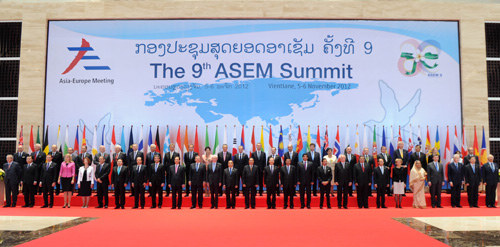|
 |
|
EURASIAN FAMILY: Asian and European leaders pose for a group photo at the ASEM Summit in Vientiane, Laos, on November 5 (ZHANG DUO) |
This year's Asia-Europe Meeting (ASEM) Summit could be summarized in two sentences: Europe hoped Asian partners would be more cooperative to get through the spreading financial crisis; and China promised its economy would remain robust. Given the complementary economic relationship between Asia and Europe, the realization of these hopes will benefit both.
Asia and Europe are interdependent due to the compatibility of their economies. With the looming threat of the global financial crisis, cooperation between Asia and Europe becomes more significant. Being the only intercontinental dialogue mechanism between Asian and European governments, the ASEM Summit is a platform for closer dialogue and more effective cooperation between the two sides. During the ninth summit in Laos' capital of Vientiane from November 5 to 6, leaders agreed to strengthen cooperation in dealing with global challenges.
The global economy has started to recover. But the recovery is slow and fragile, said Shen Jiru, a senior research fellow on global economic and political studies with the Chinese Academy of Social Sciences, pointing out that how to make the recovery easier is the common task of different countries. "Euro-zone countries, victims of the ongoing European sovereign debt crisis, need cooperation and help from other countries, especially from Asian nations, with which they have high economic compatibility," he said. According to the latest report released by the International Monetary Fund, the crisis in the euro zone remains the most significant threat the global economy faces.
Founded in 1996, ASEM now has a membership that represents half of the world's population, more than half of the world's GDP and 55 percent of world trade volume. The figures show the centrality of Asia-Europe relations in today's world, noted European Commission President Jose Manuel Barroso. "But more important than statistics and figures is the common political will to jointly address today's challenges. This relation is indeed key for the world's prosperity and security," he said.
Geographically, Asia and Europe are on the same continent, the Eurasian continent, so fostering cooperation is a good thing, said Wei Liang, a researcher with the China Institutes of Contemporary International Relations. He pointed out both economic and strategic advantages of their cooperation.
Their population and land area are big enough to form a comprehensive and independent circulatory system, which brings both sides tremendous economic benefits, Wei said. According to statistics from the EU, trade between Asian nations and EU members has grown quickly. From 2000 to 2011, the share of the ASEM partners in EU exports rose from 22 percent to 30 percent, and in imports from 36 percent to 44 percent. "There will be huge room for win-win cooperation between them," he said.
Strengthening Asia-Europe cooperation is also of strategic significance, Wei added. The United States, Europe and emerging Asian economies have been the most influential forces since the outbreak of the global crisis. Cooperation and competition coexist among the three parties, he said.
"Competition for economic and financial interests is fiercer between the United States and Europe, the two traditional developed powers," Wei said. "Strengthening cooperation with Asia will bring benefits to both Europe and Asia."
|
